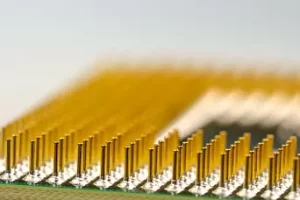Gold (Element)
What Is Gold (Element)?
Gold is one of the most recognizable materials on the periodic table of elements. We use it to make jewelry, which we then sell for hundreds of thousands of dollars. And yet, worldwide, we also throw away almost more than 300 tons of processed gold in landfills annually. That’s roughly 10 percent of all the gold mined on Earth each and every year.
How does so much of one of mankind’s most valuable and cherished metals end up mixed in with piles of old paper products, spoiled foods, and unwanted clothes? The biggest culprit is a lack of proper e-waste recycling.
Why is Gold Used to Make So Many Electronic Devices?
Gold is an extremely malleable metal, meaning it can be shaped into just about. This is why gold is often used in the creation of decorative items like necklaces, bracelets, crowns, and the like. But that also makes it useful in the creation of a number of common home appliances and electronic devices.
Even more useful is gold’s high level of electrical conductivity, which is superior to that of more common metals like copper, aluminum, and silver. In addition, gold doesn’t absorb much oxygen, which means it is extremely resistant to tarnishing.
Together, these three properties make gold uniquely suited for use in circuit boards, memory chips, processors, conductors, and connectors of all kinds. It is estimated that the average computer contains just under $10 worth of gold components.
While that might not seem like a lot, that’s still $10 that just gets thrown away when we dispose of our desktops and laptops carelessly. And it adds up quickly. Just one ton of gold is worth close to $50 million. Remember, it’s estimated that 300+ tons of gold is lost to landfills every year.
How Does Gold in E-Waste Impact the Environment?
While gold has a very low toxicity rating, it can still be a harmful contaminant of drinking water and air, and inhalation of gold particles has been linked to an increased frequency of several types of disease, including cancer.
The greatest environmental impact of improperly discarded gold e-waste, however, is in the way it removes valuable reusable materials from the manufacturing process. Gold components that could be recovered and recycled for the creation of new devices instead sit unused, requiring new gold to be mined.
Gold mining is inherently dangerous and destructive, not only displacing communities and leading to employee injuries, but also scarring the earth and releasing more overtly toxic substances, like mercury and cyanide, into the environment.
Through responsible computer recycling, however, the need to mine new gold is significantly reduced. At Newtech Recycling’s state-of-the-art facilities, computers and other electronic devices are safely broken down into their component parts, allowing gold and other precious metals to be reintroduced to the manufacturing industry for further use.
Newtech Recycles Helps Prevent Unnecessary Mining
While gold on its own poses little threat to people or the environment, it is still important to properly dispose of this valuable metal. Gold e-waste components represent a hazard not only to the economy, but also to the environment and to human health.
Let’s work together to keep gold out of landfills where it doesn’t belong. Contact Newtech Recycling today for information about how we can help you dispose of your unwanted electronics.


